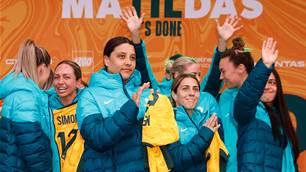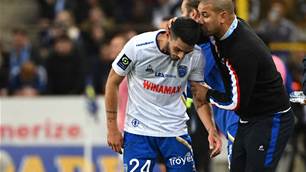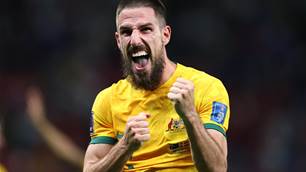Marseille were the French champions, gunning for AC Milan in the Champions League Final. But one phone call caused resignation, relegation – and incarceration for the president.
Page 2 of 3 | Single page
L’OM were a well-supported but success-starved club when Bernard Tapie became club president in April 1986. Former cheesy pop star Tapie had re-invented himself as a business pioneer who bought failing firms, turned them round and sold them at a huge profit. He ran a profitable chain of health product stores, La Vie Claire, and named his first venture in sport, his own cycling team, after the store. In 1985, his cyclist Bernard Hinault won the Tour de France, and the next year Greg LeMond made it back-to-back triumphs for La Vie Claire.
Tapie was incredibly ambitious; Marseille were perfect for him. Having not won the French league for 14 years, their fans easily bought into the new man’s success-at-all-costs philosophy. “Tapie brought glamour to the club but most of all, he made the club successful,” says Arnaud, a Marseille fan who spent most of his morning stuck in that car park. “That’s all us fans were interested in.”
Tapie was a successful precursor to the Galactico reign of Florentino Perez at Real Madrid: he brought in former France coach Michel Hidalgo as director of football and signed stars such as Alain Giresse, Jean-Pierre Papin, Enzo Francescoli, Jean Tigana, Didier Deschamps, Alen Boksic, Marcel Desailly and Rudi Voller. The team played flamboyant football and weren’t afraid to let everyone know about it.
Within three years, Marseille won the French title. That summer, Tapie spent $10.6m to sign Tottenham’s Chris Waddle. “At Marseille, Tapie did everything,” Waddle remembers. “He was ultra-powerful and he was so hungry to win, that after every bad game he would become really nasty. I was afraid of him: he was always on our backs, at the hotel, the stadium, the dressing room, even at training sometimes. Tapie was the one that did the recruitment, the one that motivated the team and he said who was playing and who wasn’t.”
In 1991, Marseille reached the European Cup final, beating AC Milan on the way with an exciting front three of Waddle, Papin and Abedi Pele, but the final was a dour game which they lost on penalties to Red Star Belgrade. Though Marseille continued to walk the French league, Tapie’s dream remained the European Cup.
In 1992-93, the new Champions League used a group format to decide the finalists and Marseille emerged from a group featuring Rangers, Club Bruges and CSKA Moscow to reach their second final in three years. Awaiting them in Munich were AC Milan.
Tapie’s dream was close to fruition. By now he was a socialist MP for Marseille, a minister in the government of his mentor, French President Francois Mitterand, with his own serious ambitions of running for the French presidency. But he got greedy and, possibly, a little scared: Tapie wanted to be sure that Marseille would at least win the French title again. So he told his right-hand man, Jean-Pierre Bernes, to make the phone call that would change both of their lives.
Officially, Bernes was general director, but he was much more than that. He was the negotiator, the man behind the deals. “During my time working for Tapie, I got through more than $1.2m on corruption money for players and referees,” he now admits.
Tapie asked Bernes to offer money to some of the Valenciennes players to go easy against Marseille. Bernes had already phoned Christophe Robert, Valenciennes’ top scorer, telling him to expect a call the night before the game. Bernes enlisted the help of midfielder Jean-Jacques Eydelie for the next part of his plan. Eydelie had played at Nantes with Robert and his Valenciennes team-mate Jorge Burruchaga; he also knew the Valenciennes captain Jacques Glassman from their time together at Tours.
Robert had guessed what was going on and went straight to Glassman to ask what he should do. Glassman thought it was a joke. “I’ve always tried to understand why they would want to contact us to fix a game which in all logic, Marseille would have won anyway,” he says. But he agreed to meet with Eydelie and Burruchaga later that night to see what would happen.
At nine on the dot, the phone rang. “Christophe answered it, said a few words and passed me the phone,” recounts Glassman. “I immediately recognised the voice of Jean-Jacques, and he started explaining to me how Marseille needed to be able to win easily ahead of the European Cup final. I interrupted him to say, ‘Do you realise what you’re saying, Jean-Jacques?’
“Seeing that I wasn’t going along with the plan, he said, ‘Hold on, I’ll pass you Bernes.’ That was when I realised that there was no chance this was a joke. Bernes came on and said in a contemptuous tone, ‘Do you prefer to lose the game for nothing or with 20 grand in your pocket?’”
Glassman, the moral hero of the piece, dropped the phone. Burruchaga, who had tried to help Marseille recruit Diego Maradona a few years earlier and received nothing for his efforts, wanted guarantees that they would get paid. The details were agreed: each player was to receive $50,000 for their “help”, with a down-payment of a total of $60,000 due before the game and the rest to come one week after the match. Robert’s wife was sent to the Marseille team hotel, the Valenciennes Novotel, to pick up the cash.
Glassman didn’t sleep all night. On the afternoon of the game, he told coach Boro Primorac. Alen Boksic scored the only goal in the 21st minute; Robert limped off two minutes later. At half-time, Primorac took Glassman’s accusation to the authorities, and lodged an official complaint to the French football federation.
After the game, federation officials met with Glassman and Tapie. It was one man’s word against the other. Marseille were four days away from their date with AC Milan.
Tapie was incredibly ambitious; Marseille were perfect for him. Having not won the French league for 14 years, their fans easily bought into the new man’s success-at-all-costs philosophy. “Tapie brought glamour to the club but most of all, he made the club successful,” says Arnaud, a Marseille fan who spent most of his morning stuck in that car park. “That’s all us fans were interested in.”
Tapie was a successful precursor to the Galactico reign of Florentino Perez at Real Madrid: he brought in former France coach Michel Hidalgo as director of football and signed stars such as Alain Giresse, Jean-Pierre Papin, Enzo Francescoli, Jean Tigana, Didier Deschamps, Alen Boksic, Marcel Desailly and Rudi Voller. The team played flamboyant football and weren’t afraid to let everyone know about it.
Within three years, Marseille won the French title. That summer, Tapie spent $10.6m to sign Tottenham’s Chris Waddle. “At Marseille, Tapie did everything,” Waddle remembers. “He was ultra-powerful and he was so hungry to win, that after every bad game he would become really nasty. I was afraid of him: he was always on our backs, at the hotel, the stadium, the dressing room, even at training sometimes. Tapie was the one that did the recruitment, the one that motivated the team and he said who was playing and who wasn’t.”
In 1991, Marseille reached the European Cup final, beating AC Milan on the way with an exciting front three of Waddle, Papin and Abedi Pele, but the final was a dour game which they lost on penalties to Red Star Belgrade. Though Marseille continued to walk the French league, Tapie’s dream remained the European Cup.
In 1992-93, the new Champions League used a group format to decide the finalists and Marseille emerged from a group featuring Rangers, Club Bruges and CSKA Moscow to reach their second final in three years. Awaiting them in Munich were AC Milan.
Tapie’s dream was close to fruition. By now he was a socialist MP for Marseille, a minister in the government of his mentor, French President Francois Mitterand, with his own serious ambitions of running for the French presidency. But he got greedy and, possibly, a little scared: Tapie wanted to be sure that Marseille would at least win the French title again. So he told his right-hand man, Jean-Pierre Bernes, to make the phone call that would change both of their lives.
Officially, Bernes was general director, but he was much more than that. He was the negotiator, the man behind the deals. “During my time working for Tapie, I got through more than $1.2m on corruption money for players and referees,” he now admits.
Tapie asked Bernes to offer money to some of the Valenciennes players to go easy against Marseille. Bernes had already phoned Christophe Robert, Valenciennes’ top scorer, telling him to expect a call the night before the game. Bernes enlisted the help of midfielder Jean-Jacques Eydelie for the next part of his plan. Eydelie had played at Nantes with Robert and his Valenciennes team-mate Jorge Burruchaga; he also knew the Valenciennes captain Jacques Glassman from their time together at Tours.
Robert had guessed what was going on and went straight to Glassman to ask what he should do. Glassman thought it was a joke. “I’ve always tried to understand why they would want to contact us to fix a game which in all logic, Marseille would have won anyway,” he says. But he agreed to meet with Eydelie and Burruchaga later that night to see what would happen.
At nine on the dot, the phone rang. “Christophe answered it, said a few words and passed me the phone,” recounts Glassman. “I immediately recognised the voice of Jean-Jacques, and he started explaining to me how Marseille needed to be able to win easily ahead of the European Cup final. I interrupted him to say, ‘Do you realise what you’re saying, Jean-Jacques?’
“Seeing that I wasn’t going along with the plan, he said, ‘Hold on, I’ll pass you Bernes.’ That was when I realised that there was no chance this was a joke. Bernes came on and said in a contemptuous tone, ‘Do you prefer to lose the game for nothing or with 20 grand in your pocket?’”
Glassman, the moral hero of the piece, dropped the phone. Burruchaga, who had tried to help Marseille recruit Diego Maradona a few years earlier and received nothing for his efforts, wanted guarantees that they would get paid. The details were agreed: each player was to receive $50,000 for their “help”, with a down-payment of a total of $60,000 due before the game and the rest to come one week after the match. Robert’s wife was sent to the Marseille team hotel, the Valenciennes Novotel, to pick up the cash.
Glassman didn’t sleep all night. On the afternoon of the game, he told coach Boro Primorac. Alen Boksic scored the only goal in the 21st minute; Robert limped off two minutes later. At half-time, Primorac took Glassman’s accusation to the authorities, and lodged an official complaint to the French football federation.
After the game, federation officials met with Glassman and Tapie. It was one man’s word against the other. Marseille were four days away from their date with AC Milan.
Related Articles

Matildas criticise record crowd as not loud enough

PSG win, Kisnorbo has first Ligue 1 loss













